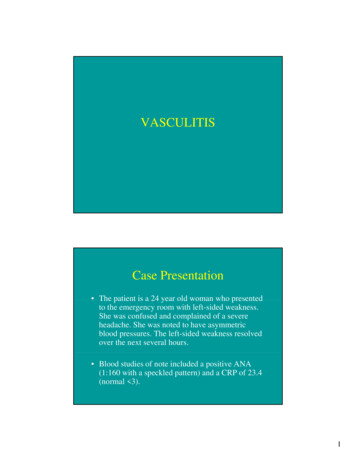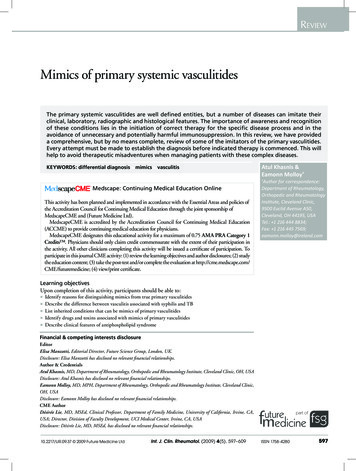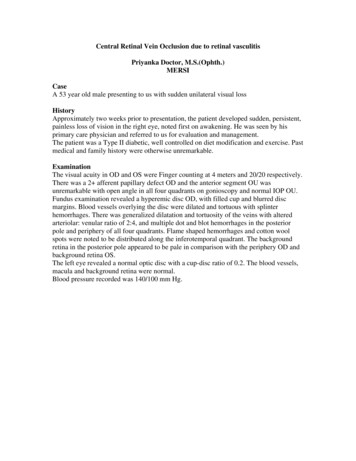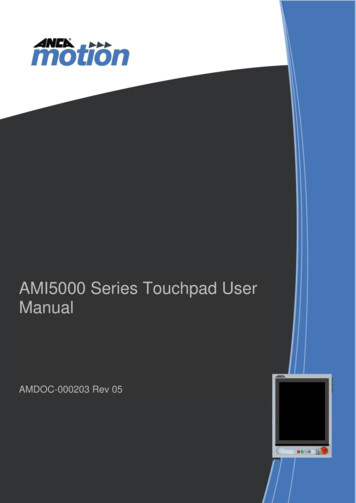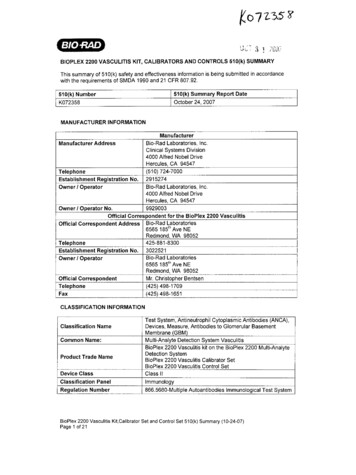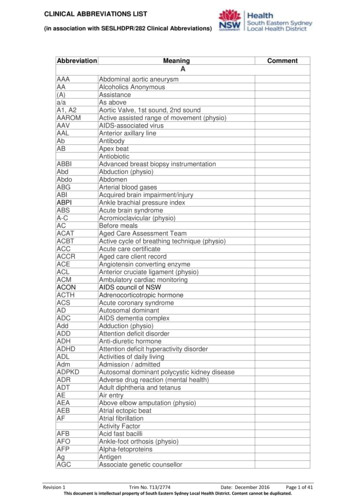
Transcription
KDIGO GN Guideline update – Evidence summaryImmunosuppressive therapy for ANCA associated nephritisPICO questionIn patients with ANCA associated nephritis, what immunosuppressive agents compared to notreatment/placebo or other immunosuppressive therapies improve clinical efficacy (all-causemortality, end-stage kidney disease, 50% loss of GFR, annual loss of GFR, complete remission)outcomes and reduce adverse effects (infection, and malignancy)?Search strategy and selectionKeywords for ANCA-associated nephritis, renal vasculitis, and immunosuppressive therapy wereused to search the Cochrane Kidney and Transplant Specialized Register for all RCTs published up toMay 2018.Search resultsThe original Cochrane review was published in 2008. An updated review was published in 2015identified 31 primary studies (146 reports) with 2217 participants; five (13 reports) ongoing studieswere also identified. The 2018 search update identified 63 reports, six reports were excluded becausethey were not RCTs, did not include patients with ANCA associated nephritis, or the wrongintervention. 13 primary studies (33 reports), one ongoing study, and five studies (six reports) ofstudies recently completed but with no full-text publication were identified.Overall, the 2018 Cochrane review update identified 39 studies (209 reports) with 3296 participants,four ongoing studies (17 reports) (Figure 1).Figure 1. Study flow diagramInduction therapy1
Twelve comparisons for induction therapy were included for the following:1. Plasma exchange as adjunctive therapy versus usual care (8 studies, 1020 participants; meanfollow-up 28 months)2. Pulse versus continuous cyclophosphamide (4 studies, 300 participants; mean follow-up 23months)3. Rituximab versus IV cyclophosphamide (2 studies, 241 participants; mean follow-up 21months)4. Mycophenolate mofetil versus cyclophosphamide (3 studies, 216 participants; mean followup 10 months)5. Methotrexate versus cyclophosphamide (1 study, 95 participants; 18 months follow-up)6. Avacopan versus prednisolone (1 study, 67 participants; 3 months follow-up)7. Intravenous immunoglobulin versus placebo (1 study, 34 participants; 12 months follow-up)8. Etanercept versus placebo (1 study, 180 participants; median follow-up for the etanerceptgroup was 25 months and 19 months for the control group)9. Plasma exchange versus immunadsorption (1 study, 44 participants; 6 months follow-up)10. Lymphocytaphaeresis versus control (1 study, 24 participants; 6 months follow-up)11. Six versus 12 cyclophosphamide pulses (2 studies, 171 participants; mean 36 months followup)12. Reduced dose versus standard dose steroids (1 study, 704 participants; follow-up unclear)Maintenance therapyEleven comparisons for maintenance therapy were included for the following:1. Azathioprine versus cyclophosphamide (1 study, 155 participants; 18 months follow-up)2. Mycophenolate mofetil versus azathioprine (1 study, 156 participants; 4 years follow-up)3. Azathioprine versus methotrexate (1 study, 126 participants; 3 years follow-up)4. Leflunomide versus methotrexate (1 study, 54 participants; 24 months follow-up)5. Methotrexate versus cyclophosphamide (1 study, 95 participants; 18 months follow-up)6. Pre-emptive therapy for relapse versus standard of care (2 studies, 60 participants; follow-upunclear)7. Antibiotics versus placebo (2 studies, 112 participants; mean follow-up 12.5 months)8. Cyclosporin versus cyclophosphamide (1 study, 32 participants; 5 years follow-up)9. Extended versus standard azathioprine (3 studies, 866 participants; mean follow-up 32months)10. Rituximab versus azathioprine (1 study, 115 participants; 28 months follow-up)11. Methotrexate versus cyclophosphamide (1 study, 71 participants; 24 months follow-up)Summary of the main findingsInduction therapyPlasma exchange as adjunctive therapy versus usual care Patients with severe acute kidney injury secondary to vasculitis or rapidly deterioratingkidney function were included in these eight RCTs (1020 participants).Compared to usual care, plasma exchange as adjunctive therapy probably has little or noeffect on all-cause mortality (RR 0.96, 95%CI 0.72 to 1.29; 6 studies, 957 participants) but itprobably decreases end-stage kidney disease at 12 months (RR 0.45, 95%CI 0.29 to 0.72; 6studies, 235 participants).2
Plasma exchange as adjunctive therapy probably increases infection (RR 1.26, 95%CI 1.03 to1.54); however may have little or no effect on other serious adverse events and the inductionof complete remission, compared to usual care.Pulse cyclophosphamide versus continuous cyclophosphamide Patients with systemic rather than specifically renal vasculitis were included in these studiesCompared to continuous cyclophosphamide, pulse cyclophosphamide may have little or noeffect on all-cause mortality, end-stage kidney disease, and infection.Pulse cyclophosphamide probably has little or no effect on complete remission at 18 months.Other critical and important outcomes ( 50% loss of GFR, malignancy, and annual loss ofGFR) were not reported in RCTs. Rituximab versus cyclophosphamideCompared to cyclophosphamide, treatment with rituximab has little or no effect on infection(RR 0.89, 95%CI 0.42 to 1.92; 2 studies, 241 participants) and probably little or no effect oncomplete remission at 6 months (RR 1.02, 95%CI 0.79 to 1.32; 2 studies, 236 participants). Effects on other critical or important outcomes are unclear, as they were not reported in RCTsor due to very low evidence because of study limitations and very serious imprecision.Mycophenolate mofetil versus cyclophosphamide The effects of mycophenolate mofetil compared to cyclophosphamide on all-cause mortalityand end-stage kidney disease are uncertain because they have only been examined in oneRCT with study limitations and few events. We cannot be certain of the effect of mycophenolate mofetil on other critical and importantoutcomes compared to cyclophosphamide as they were not reported in RCTs. Azathioprine plus steroids may decrease all-cause mortality, but effects on other critical andimportant clinical and safety outcomes are uncertain because the certainty of the evidence isvery low.Intravenous immunoglobulin versus placeboCompared to placebo plus standard of care, IV immunoglobulin may increase the treatmentresponse (BVAS reduction 50%) at three months (RR 2.33, 95%CI 1.18 to 4.61; 1 study, 35participants). Effects on other critical and important outcomes are unclear as they were notreported by the RCT or due to serious risk of bias and imprecision.Other immunosuppressive agents Methotrexate compared to cyclophosphamide may decrease relapse (RR 0.57, 95%CI 0.34 to0.96; 1 study. 89 participants). However, it may have little or no effect on complete remissionat six months (RR 0.96, 95%CI 0.85 to 1.08; 1 study, 95 participants). The effect on othercritical and important outcomes are unclear, as they were not reported or due to very fewevents. Avacopan may improve eGFR compared to prednisolone (MD 3.3 higher, 95%CI 0.57 higherto 6.03 higher; 1 study, 41 participants). The effects on other outcomes are uncertain, as theywere not reported in RCTs or due to very serious imprecision and study limitations (completeremission. Treatment with etanercept compared to placebo plus standard of care was examined in oneRCT (174 participants). The effects on all-cause mortality and relapse are uncertain becauseof very few events and study limitations. It may have little or no effect on infection (RR 1.00,95%CI 0.74 to 1.35) and sustained complete remission (RR 0.93, 95%CI 0.77 to 1.11). Othercritical and important outcomes were not examined in the RCT. The effects of plasma exchange compared with immunoadsorption are very uncertain, as itwas only examined in one small RCT (44 participants) and many critical and importantoutcomes were not reported.3
It is uncertain if lymphocytapheresis compared with standard of care increases or decreasescritical or important outcomes because the certainty of the evidence was very low oroutcomes were not reported in the small RCT (24 participants). The use of six compared with 12 cyclophosphamide pulses may have little or no effect on allcause mortality and serious adverse events. It probably has little or no effect on completeremission (RR 0.99, 95%CI 0.85 to 1.15; 2 studies, 151 participants), and relapse (RR 1.57,95%CI 0.96 to 2.56. The effect on other critical and important outcomes are uncertain due tothe very low certainty of evidence. Reduced dose prednisone compared with standard dose prednisone may have little or noeffect on all-cause mortality, end-stage kidney disease, infection, sustained completeremission, and serious adverse events. Other critical and important outcomes were notreported in the RCT (704 participants).Maintenance therapyAzathioprine versus cyclophosphamideIn one RCT (144 participants) azathioprine compared with cyclophosphamide probably haslittle or no effect on infection (RR 1.03, 95%CI 0.51 to 2.06) and relapse (RR 1.13, 95%CI0.51 to 2.50). However, it probably decreases leukopenia (RR 0.65, 95%CI 0.42 to 0.99).Other critical and important outcomes were not reported.Azathioprine versus methotrexate One RCT (126 participants) found that azathioprine compared to methotrexate probably haslittle or no effect on relapse (RR 1.10, 95%CI 0.68 to 1.77) or adverse events resulting inhospitalization or study drug discontinuation (RR 0.58, 95%CI 0.25 to 1.38). Other criticaland important outcomes were not reported.Leflunomide versus methotrexate In one small RCT (54 participants), leflunomide compared to methotrexate probably has littleor no effect on infection (RR 1.17, 95%CI 0.66 to 2.07), and relapse (RR 0.52, 95%CI 0.22 to1.11). Other critical and important outcomes were not examined.Mycophenolate mofetil versus azathioprine Compared to azathioprine, mycophenolate mofetil probably decreases relapse (RR 1.47,95%CI 1.04 to 2.09; 1 study, 156 participants). It may have little or no effect on infection, andother critical and important outcomes have not been examined in the RCT.Antibiotics versus placebo The use of trimethoprim/sulfamethoxazole (160/800 mg) compared to placebo may little or noeffect on mortality at six months, and complete remission at one and two years. Other criticaland important outcomes were not examined in RCTs.Other immunosuppressive therapy Rituximab compared with azathioprine (1 study, 115 participants) probably decreasesmajor relapse (RR 0.18, 95%CI 0.06 to 0.58) while it may have little or no effect onminor relapse (RR 0.68, 95%CI 0.26 to 1.78). The effect on other critical andimportant outcomes is unclear because of very low certainty of evidence (all-causemortality, infection) or they were not reported in the RCT.Compared to cyclophosphamide, cyclosporin probably has little or no effect onrelapse (RR 1.38, 95%CI 0.82 to 2.33; 1 study, 64 participants).There was insufficient evidence to assess if methotrexate improves or worsens criticaland important outcomes compared to maintenance therapy with cyclophosphamide.Extended azathioprine therapy (1.5 to 2.0 mg/kg/d until 4 years after diagnosis, thentapered by 25 mg every 3 months) compared to standard azathioprine therapy (1.5 to2.0 mg/kg/d until 12 months after diagnosis, then tapered by 25 mg every 3 months)4
had uncertain effects on all-cause mortality, end-stage kidney, infection and seriousadverse events disease because of study limitations and very serious imprecision. Itprobably decreases relapse (RR 0.41, 95%CI 0.26 to 0.64; 2 studies, 162 participants). We are uncertain of the effects of pre-emptive therapy compared to usual treatment/follow-upbecause of the very low certainty of the evidence.5
Effect modifiersThe following effect modifiers were considered for the comparisons:Plasma exchange as adjunctive therapy versus usual care (8 studies, 1020 participants)Effect modifierExplanation/ resultsKidney function (GFR, proteinuria,presence of albuminuria)Patients in the RCTs comparing plasma exchangeadjunctive therapy to usual care had severe deterioratingkidney function or acute kidney injury. MEPEX 2007 only included patients with serumcreatinine 500 µmol/L) Glockner 1988 included patients with 70%crescents Cole 1992 only included patients with crescents 50% Rifle 1980 only included patients with crescents 50%Exclusion of the Cole 1992 study to the outcomes all-causemortality, end-stage kidney disease and infection made nodifference to the overall effect estimate, and introducedgreater imprecision for the infection outcome and thereforeinappropriate to report.One study (Szpirt 2011) reported that proteinuria 1g/dayincreased relapse (OR 3.7, 95%CI 1.4 to 10.2) andcreatinine 250 µmol/L increased end-stage kidney diseaseand death (OR 5.3, 95%CI 1.6 to 17.4).Relapse or resistant diseaseTrials did not examine the treatment of patients withrelapsing or resistant disease.GenderThe trials largely included a majority of male patients(range 57-78%) and did not present results according togender.Age (adult vs. pediatric)Two studies included children less than 18 years of age.However, they did not separate the results according toadults and children.Presence of pulmonary hemorrhageMost RCTs did not provide any data on patients withpulmonary hemorrhage, and some RCTs excluded patientswith pulmonary hemorrhage.However, PEXIVAS 2011 included patients withpulmonary hemorrhage but did not separate results for thesepatients.Serology (Presence of ANCA etc.)The presence of ANCA is reported in the two more recentstudies. The majority of patients in the MEPEX 2007 studyare positive for ANCA (94.7%), and all patients in theSzpirt 2011 are ANCA positive.There was insufficient data in other comparisons to report on effect modifiers.1. Cole 1992 - Cole E, et al. A prospective randomized trial of plasma exchange as additivetherapy in idiopathic crescentic glomerulonephritis. The Canadian Apheresis StudyGroup. AJKD. 1992;20(3):261-9.6
2. Glockner 1998 – Glockner WM, et al. Plasma exchange and immunosuppression in rapidlyprogressive glomerulonephritis: a controlled, multi-center study. Clinical Nephrology1988;29(1):1-83. MEPEX 2007 - Jayne DR, et al. Randomized trial of plasma exchange or high-dosagemethylprednisolone as adjunctive therapy for severe renal vasculitis. JASN. 2007;18(7):2180-84. Rifle 1980 - Rifle G, et al. Treatment of idiopathic acute crescentic glomerulonephritis byimmunodepression and plasma-exchanges. A prospective randomised study. Proceedingsof the European Dialysis & Transplant Association. 1981;18:493-502.5. Szpirt WM, et al. Plasma exchange for induction and cyclosporine A for maintenance ofremission in Wegener's granulomatosis -a clinical randomized controlled trial. NephrologyDialysis Transplantation. 2011;26(1):206-13.6. PEXIVAS 2011 - Walsh M, et al. Plasma exchange and glucocorticoid dosing in the treatment ofanti-neutrophil cytoplasm antibody associated vasculitis (PEXIVAS): protocol for a randomizedcontrolled trial. Trials. 2013;14:73.7
Studies from the 2012 KDIGO GN guideline evidence tables not included in 2018evidence review.All RCTs included in the previous guideline evidence summary have been included in this evidencereview.8
Keywords for ANCA-associated nephritis, renal vasculitis, and immunosuppressive therapy were used to search the Cochrane Kidney and Transplant Specialized Register for all RCTs published up to May 2018. Search results The original Cochrane review was published in 2008. An updated review was published in 2015

